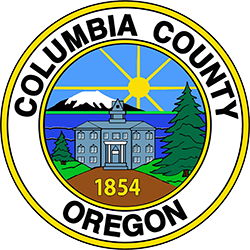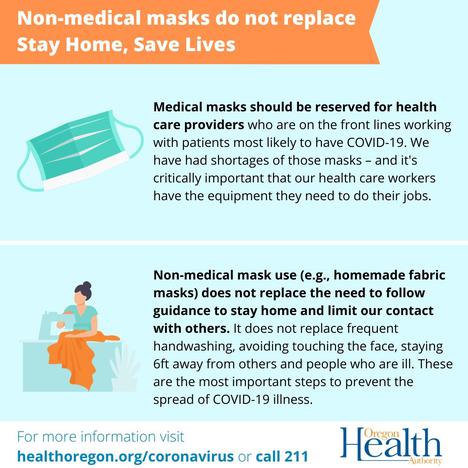Face Coverings
Face Coverings
Masks, face shields or face coverings are currently recommended statewide for indoor public spaces (for example, grocery stores, pharmacies, personal services providers, restaurants, bars, retail stores, and more).
For more information on face covering guidance, please visit Oregon Health Authority's Oregon COVID-19 Mask Requirements→ or Reopening Guidance FAQs Statewide Mask, Face Shield, Face Covering Guidance→
Previous recommendation
At the beginning of this pandemic, the strong message to the public from the Centers for Disease Control and the World Health Organization was not to wear face coverings unless you were already infected and needed to interact with others. The assumption was that people didn’t spread the disease without symptoms, and that droplet spread occurred with coughing and sneezing. Also, there was a shortage of masks for healthcare workers.
New evidence about transmission
We recently learned that a significant portion of individuals with coronavirus lack symptoms (“asymptomatic”) and that even those who eventually develop symptoms (“pre-symptomatic”) can transmit the virus to others before showing symptoms. This means that the virus can spread between people interacting in close proximity—for example, speaking, coughing, or sneezing—even if those people are not exhibiting symptoms.
New CDC recommendation
Given this new evidence, the CDC changed its recommendation. The CDC now recommends wearing cloth face coverings in public settings where other social distancing measures are difficult to maintain (e.g., grocery stores and pharmacies), especially in areas of significant community-based transmission.
State recommendations
As of July 1st, 2020 Statewide Mask, Face Shield, Face Covering Guidance→ This Guidance applies to all businesses, and to the general public when visiting these businesses and indoor spaces open to the public.
Local recommendation
We have community-based transmission in Columbia County. The use of a cloth face coverings is one more thing you can do to protect others when you cannot maintain a distance of 6 feet between others in a public setting. The use of cloth masks fashioned from household items or made at home from common materials at low cost is an additional, voluntary public health measure that may help us slow the spread of coronavirus.
It is important to remember the most effective strategies to prevent infection include the physical distancing measures in the Governor’s Executive Orders, along with basic hand hygiene and cough etiquette. Don’t assume that wearing a mask takes the place of any of those healthy behaviors. Please continue to:
- Avoid all social and recreational activities in which you cannot maintain a distance of 6 feet between others;
- Maintain at least 6 feet of distance from others during any necessary trips to grocery stores, pharmacies, or healthcare entities;
- Cover your cough or sneeze with a tissue and discard it immediately; or cough or sneeze into your upper sleeve rather than into your hands;
- Avoid touching your eyes, nose, mouth, or face;
- Clean your hands regularly and thoroughly with soap and water, or use alcohol-based hand sanitizer if handwashing is not possible; and
- If sick, isolate yourself and stay away from work, family, and friends until 72 hours after both fever and cough have resolved, without the use of fever-reducing medications.
At work
Employees, contractors and volunteers in Oregon are now required to wear a face covering at work. A business can also require customers to wear one to protect employees.
Remember, some people can't wear a face covering due to a health condition, age or ability. Face covering requirements do not apply in these cases. You must not discriminate against those who can’t wear one.
Helpful tool:
Who should not wear a face covering
Cloth face coverings should NOT be worn by children under the age of 2 or anyone who has trouble breathing, is unconscious, incapacitated, or otherwise unable to remove the mask without assistance.
Face shields
We do not recommend face shields for normal, everyday activities or as a substitute for cloth face coverings.
There’s no scientific evidence to suggest that face shields are superior to face coverings in preventing the spread of COVID-19. Scientists don’t know if they contain your droplets when you exhale, cough, sneeze, sing, or talk. They don’t know if face shields protect people around you.
You may use a face shield if you cannot tolerate a face covering or as an extra layer of protection over a face covering. However, if you do wear one, you should ALWAYS remain 6 feet apart from others.
The face shield should wrap around the sides of your face, cover the forehead, and extend below the chin.
Reusable face shields should be cleaned and disinfected after each use.
Plastic face shields for newborns and infants are NOT recommended.
Medical masks
- The general public should not wear medical masks or N95 respirators.
- Health care workers need these medical masks to stay safe and do their jobs.
- Medical masks are in limited supply and we need to make sure these are only for front line health care workers.
- If you are using KN95 masks, please review Oregon Health Authority Guidance for the use of KN95 masks→
How to use cloth face coverings
When wearing a cloth face covering, make sure:
- Your mouth and nose are fully covered.
- It fits snugly against the sides of the face, with no gaps.
- You don’t have any difficulty breathing
The tighter the weave and the thicker the cloth, the better it will fit your face and provide protection.
Wash after every use with soap and warm water.
Cloth face coverings can be itchy. Don’t reach under it to touch your nose or mouth.
CDC: How to Wash Cloth Face Coverings→
Need a face covering?
Do you, or someone you know need a face covering?
- Contact Columbia County Mask Makers Group by emailing mnamomma5@gmail.com with your request.
- You can also follow them on Facebook at The Mask Makers→.
Want to donate?
- Check out How to Donate→ for more information and how and where to make monetary or material donations to The Mask Makers.
- Drop off sites:
- St. Helens Elks Veterans Bunker - (503) 410-5225
- Artifacts: A Tinker's Marketplace - (503) 333-8436- hours are Thurs - Sat, 11AM to 5PM, Sun, Noon to 5PM, and by appointment.


